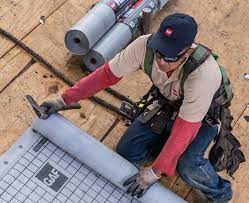Advantages of Concrete Slabs in Construction: Durability and Versatility
Concrete, which is frequently called the foundation of contemporary construction, has been an indispensable material for edifices for centuries. Due to its strength, adaptability, and durability, it is a preferred material for a wide range of construction applications. The concrete slab is one of the most frequently used forms of concrete in construction. Concrete slabs provide a multitude of benefits that significantly enhance the durability and versatility of structures. This blog will examine the benefits of utilizing concrete slabs in the construction industry, with an emphasis on their adaptability and longevity. Furthermore, the significance of professional concrete services in guaranteeing the effective execution of concrete slab projects will be touched upon briefly.
Advantage No. 1: Exceptional Durability
In terms of longevity, concrete slabs are virtually unrivaled. Their resistance to physical stresses and a variety of environmental factors makes them an ideal material for durable structures. Listed below are several important reasons why concrete slabs are so resilient:
- Strength: Concrete slabs are renowned for their remarkable capacity to withstand compression. This indicates that they are capable of withstanding substantial loads without deforming or cracking. Concrete slabs are capable of supporting the weight of structures, vehicles, and industrial equipment all at once.
- Resistance to Weathering: Concrete exhibits exceptional resistance to both weathering and environmental degradation. It is impervious to precipitation, snow, ultraviolet radiation, and temperature fluctuations. As a result, concrete slabs are suitable for use in both indoor and outdoor environments.
- Chemical Resistance: Concrete slabs possess exceptional resistance to an extensive variety of chemicals, such as salts, acids, and alkalis. Thus, they are suitable for application in industrial environments characterized by frequent contact with corrosive substances.
- Fire Resistance: Fire resistance is an inherent characteristic of concrete, which provides significant safeguarding in the event of a fire. High temperatures do not cause it to degrade and it does not contribute to the propagation of flames.
- Longevity: Concrete slabs that are installed and maintained properly can provide a sturdy foundation for buildings and structures for decades.
Advantage No. 2: Design and Application Versatility
Concrete slabs are extraordinarily adaptable, permitting an extensive array of design options and applications. Their versatility is one of the factors contributing to their widespread use in the construction industry. In the following ways do concrete slabs demonstrate their adaptability:
- Architectural Freedom: Concrete slabs are adaptable to a wide range of architectural styles, including modern and traditional. To attain the intended visual appearance, one may form, texture, and finish them.
- Indoor and Outdoor Application: Concrete slabs are suitable for residential, commercial, and industrial projects because they can be utilized both indoors and outdoors. They function as the structural underpinning for structures, patios, driveways, and more.
- Surface Finishes: Concrete slabs can be finished with exposed aggregate, stamped, polished, or stained, among other techniques, to produce a variety of surface textures and appearances.
- Incorporation of Additives: To improve properties such as color, strength, or resistance, a variety of additives may be incorporated into the concrete mixture. This feature allows for tailoring to fulfill particular project specifications.
- Structural Versatility: Concrete slabs have the ability to function as suspended slabs, roof slabs, or foundation slabs, contingent upon the structural requirements of the given undertaking. They are suitable for installation in high-rise structures, commercial warehouses, and residential basements.
Advantage No. 3: Energy Efficiency
In numerous ways, concrete slabs contribute to the energy efficiency of buildings:
- Thermal Mass: Concrete is capable of absorbing and retaining heat due to its exceptional thermal mass properties. This contributes to energy savings by regulating indoor temperatures and decreasing the need for heating and cooling.
- Radiant Heating: Concrete slabs are capable of accommodating radiant heating systems. These systems improve comfort and energy efficiency by distributing heat uniformly through the use of the thermal mass of the concrete.
- Efficiency in Cooling: Concrete slabs can be engineered to reflect solar heat in warm climates, thereby reducing the cooling demand on structures and subsequent energy usage.
Advantage No. 4: Low maintenance
In comparison to many other construction materials, concrete slabs require little upkeep. With the proper design and construction, concrete slabs require little maintenance throughout their lifetime. They require the following to be low-maintenance:
- Resistant to Rot and Pests: In contrast to wood, concrete is impervious to decay, fluctuations in temperature, and infestation by pests such as termites. This obviates the necessity for routine examinations and treatments.
- Easy Cleaning: Slabs of concrete require only periodic pressure washing and routine sweeping to maintain a clean appearance. The process of stain removal requires little effort.
- Longevity: The extended lifespan of concrete slabs ultimately results in time and cost savings associated with maintenance and repairs.
- Durability: Concrete’s capacity to endure environmental damage and weathering results in its inability to deteriorate, thereby further diminishing the need for routine maintenance.
Although concrete slabs provide a multitude of benefits, it is critical to acknowledge the significance of employing professional concrete services when handling this substance. Professional concrete contractors like Venture Concrete Columbia, LLC are equipped with the expertise and experience necessary to guarantee that concrete slabs are accurately mixed, poured, and completed. This results in a product that is structurally sound and durable.
To Conclude,
Concrete slabs are an essential component of contemporary construction due to their exceptional longevity, adaptability, and energy effectiveness. Due to their resistance to environmental influences, versatility in design, and low maintenance requirements, they are highly regarded for an extensive array of construction endeavors. In addition, it is recommended that you seek the assistance of professional concrete services when working with concrete slabs in order to guarantee the smooth progression of your undertaking from its inception to its conclusion. By utilizing the benefits of concrete slabs and the expertise of seasoned professionals, it is possible to construct enduring and robust structures that withstand the test of time, click here to learn more.






